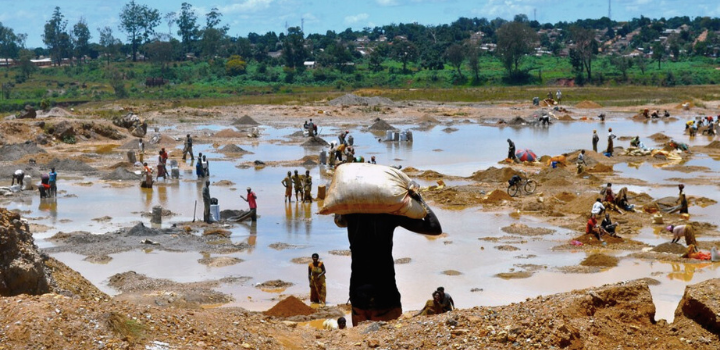Will the UK lead on human rights and ditch dirty practices in the race for green energy? – Inside track
4 min read
This post is by Anneke Van Woudenberg, executive director of RAID. It is part of our ‘Critical raw materials in focus’ series, a collection of blogs spotlighting the management of critical raw materials in the UK.
Last month, Foreign Secretary David Lammy stood at a leafy podium in Kew Gardens declaring an end to “climate apathy” and setting out a vision for a “global green power alliance” that wouldn’t repeat the “great injustices” of the fossil fuel era. It was an inspiring message, but turning words into action will require more than lofty ambitions. It demands decisive steps to rein in multinational companies that continue to drive human rights abuses and environmental harm abroad. The real question is: will the UK government rise to this challenge?
David Lammy rightly acknowledged that the global race to secure critical minerals like copper, cobalt, nickel and lithium – crucial for our electric vehicles (EVs) and renewable technologies – is accelerating. Yes, we need these minerals to address the climate crisis and bringing them to market quickly is essential. But speed cannot come at the expense of repeating the mistakes of the past.
The fossil fuel economy has left behind a legacy of devastation, with toxic spills and pollution that still blight communities today. If we want the green energy transition to be different, it must be anchored in respect for human rights and a commitment to fairness in the transition to a low carbon economy. So far, we’re falling dangerously short.
Environmental harm is happening nowTake the Democratic Republic of Congo (DRC), which sits at the heart of the green economy, as it has most of the world’s cobalt, a critical mineral for lithium-ion batteries in EVs. At RAID, we’ve investigated five of the largest copper-cobalt mines in Kolwezi, the epicentre of the DRC’s cobalt industry.
Our research, conducted alongside Congolese civil society group AFREWATCH, paints a disturbing picture: the lives of hundreds of thousands of people living near industrial cobalt mining operations are being devastated. Rivers and lakes are so contaminated that fish have disappeared, crops fail because of toxic soil and families struggle to find clean water for drinking, let alone washing. This isn’t the promise of a green economy, it’s a nightmare pushing communities deeper into poverty.
Women and girls are bearing the brunt. A staggering 56 per cent of those we interviewed reported gynaecological and reproductive health issues, which they directly link to pollution from the mines. It’s hardly surprising when they’re forced to wash with contaminated water.
The promise of new jobs in the green economy is also falling short. Thousands of workers in DRC’s cobalt mines, often hired through subcontractors, are trapped in low paid jobs with dire working conditions. With few alternatives, they’re forced to accept wages that fall below the living wage of $501 per month. Exploitation, unsafe environments and abuse are part of the daily grind.
These are the harsh realities of today’s so-called ‘clean’ energy transition.
No one is regulating critical minerals supply chainsWe are far from achieving an extractive industry and a critical mineral supply chain that respects human rights. When my colleagues and I spoke to the car companies building our EVs, few had mapped out their supply chains or checked for associated human rights risks. Those that had done the research tend to remain silent on their findings, offering little transparency or corrective action.
While industry-led “responsible sourcing” schemes exist, they are often weak and unenforced. What we need is a mandatory, legal framework, one that requires companies to conduct thorough human rights due diligence and to be held accountable when they fail to meet obligations.
There are signs of progressOn this front, there are signs of progress and laws are beginning to change. Recent landmark rulings in Canada, France and the Netherlands show that communities impacted by corporate abuse can win against unscrupulous companies. Human Rights Due Diligence laws are gaining traction globally, including in the EU, forcing companies to face up to their responsibilities.
The UK isn’t completely out of the picture. The UK Supreme Court, in two unanimous rulings against Vedanta and Shell, has made it clear that British companies owe a “duty of care” towards local communities and can be held accountable for harm caused by their foreign subsidiaries.
The UK should lead with new legislationWhile British courts have been progressive, our laws are lagging behind. This is where bold action from David Lammy and the Labour government is needed. It’s time for a Business Human Rights and Environment Act, ensuring that companies sourcing minerals for the green economy are held to the highest standards. The UK has led before with the Modern Slavery Act and the Bribery Act. Now, it must lead again.
The foreign secretary’s vision for a “global green power alliance” is a step in the right direction. But if we’re serious about not repeating the mistakes of the past, we need to tackle today’s challenges head on and commit to a future where human rights and environmental sustainability are non-negotiable. That’s the only way to ensure a green energy transition that benefits everyone, from consumers driving electric vehicles in London to the communities mining minerals in Kolwezi.
Image courtesy of Bas Van abel via Flickr.
Discover more from Inside track
Subscribe to get the latest posts sent to your email.





